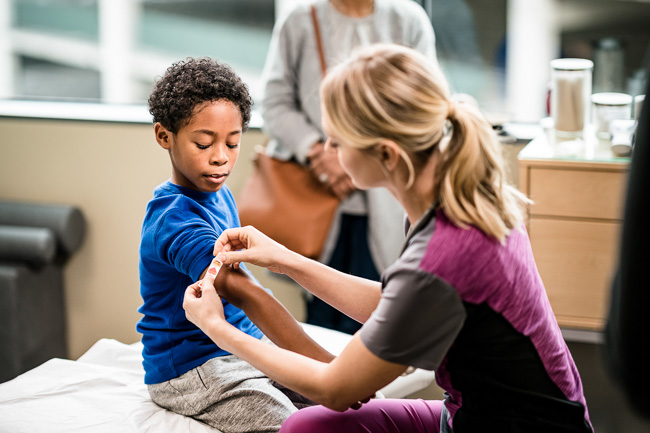With COVID-19, the flu, and some allergies having similar symptoms, it can be difficult to know if you should get a test, quarantine, or just take it easy. Here are five things to know that will help you navigate your symptoms.
1. What are common flu symptoms?
According to the Centers for Disease Control and Prevention (CDC), flu symptoms usually appear suddenly after exposure. Here are some of the possible signs you may have a flu:
- Fever or feeling chills
- Cough
- Sore throat
- Runny or stuffy nose
- Muscle or body aches
- Headaches
- Fatigue
Flu can cause serious illness and sometimes death. Because this virus changes each year, it’s recommended that everyone who is eligible get a flu shot before the start of the flu season, which typically spans November through February. The flu is mostly contagious during the first three to four days of the illness, but sometimes can be contagious even longer. Visit the CDC website to learn more about the flu.
2. How are flu symptoms different than COVID symptoms?
What used to be a clear sign of COVID is not so clear-cut anymore. Dulled senses of taste and smell are no longer considered good indicators of a COVID infection. This makes it even harder to tell the difference between a cold, a flu, and a COVID infection. The new COVID variants like Eris (EG.5) and Omicron BA.2.86, tend to have the following symptoms:
- Fever or chills
- Cough
- Shortness of breath or difficulty breathing
- Fatigue
- Muscle or body ache
- Headache
- New loss of taste or smell
- Sore throat
- Congestion or runny nose
- Diarrhea
- Nausea or vomiting
These symptoms may be a sign of COVID infection, but these also could mean you have a different illness.
Those sick with COVID-19 can spread the virus that causes the disease for two to three days before symptoms appear and you can still be infectious eight days after you no longer have symptoms. If symptoms do appear, it’s best to keep clear of big gatherings and notify those you’ve been in contact with prior to the symptoms coming on. Learn more about COVID here.
3. When should I take a COVID-19 test?
If you have symptoms or have been exposed to COVID, it’s recommended that you self-test with an at-home COVID test first. You can also check with your primary care provider or urgent care clinic for a test.
You can get free at-home COVID tests from the government at covidtests.gov. If you still have unused at-home tests kits, check the expiration dates as many of the expiration dates have been extended. Testing not only helps you but will also keep those around you safe. Don’t wait to test if you think you have contracted COVID.
4. What should I do if I test positive for COVID or if I’ve been exposed to someone?
The CDC recommends that if you test positive for COVID, you should stay home and isolate yourself from others for at least five days from the date you tested positive. If you had no symptoms, you can end isolation after five days. If you do have symptoms, the CDC recommends that you wait until you are fever free for 24 hours, without the use of fever-reducing medicines, to end your isolation.
It is also recommended that when you do end isolation, you continue to wear a mask when around others for at least 10 days. You can learn more about exposure and recommendations from the CDC here.
5. What is RSV?
RSV (Respiratory Syncytial Virus) is a potentially dangerous, highly contagious virus that can cause respiratory disease. Anyone can get RSV, but doctors know it can be more serious for adults over 60, including those with underlying medical conditions, and babies.
RSV usually causes mild, cold-like symptoms that typically show up within 4 to 6 days after getting infected. Those symptoms include:
- Runny nose
- Decrease in appetite
- Coughing
- Sneezing
- Fever
- Wheezing
Anyone infected with RSV is usually contagious for three to eight days but may be contagious for one to two days before symptoms appear. There is a new vaccine available, and the CDC recommends that you check with your provider about whether the RSV vaccine is appropriate for you.
Because symptoms are similar between all three viruses, it’s important to get tested and get appropriate treatment or medications as soon as possible. Check with your healthcare provider for more information on testing and treatments. The more education you have surrounding these infections, the safer you, your family, and your community will be.
Check out our previous ‘Five things to know’ blogs to learn more about getting vaccinated and for more information about the how the latest vaccines can help prevent you from becoming ill or lessen your symptoms.




